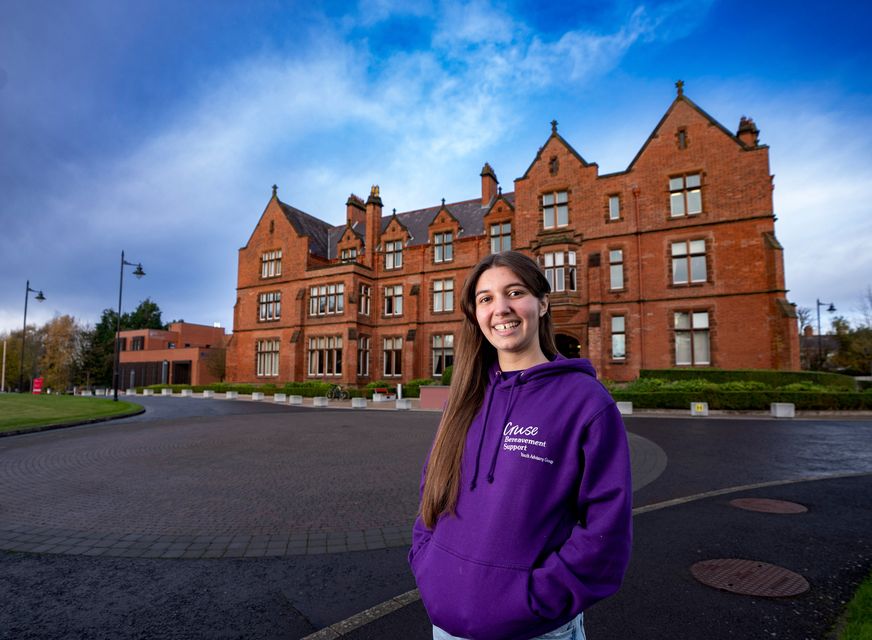A schoolgirl who struggled to cope with the death of her brother has joined Marie Curie in calling for better bereavement services in schools.
Emma Papaconstantinou (15), who lost her brother Georgie to leukaemia when she was only four, is supporting a campaign from the charity for greater focus on how schools can help young people experiencing bereavement in early life.
Statistics show that most young people will experience a bereavement before they leave school.
Now Marie Curie has launched a report designed to embed a culture and practice of grief education and bereavement support across education in Northern Ireland.
The report consolidates the findings from a three-year Schools Bereavement Programme supporting bereaved children and young people in schools and colleges.
Senior policy managers at Marie Curie and experts including the chair of the Northern Ireland bereavement network, Dr Patricia Donnelly OBE and NI mental health champion Professor Siobhán O’Neill have backed the campaign.
It has also received support from the Department of Education as well as teachers and young people.
“Children and young people grieve. We may grieve differently to adults, or even to each other,” said Emma, helping to launch the report recommendations on Wednesday.
“But we need support from the place where we spend the majority of our time, the place that has a duty to look after our wellbeing and as part of this we need to be taught about our grief so we can understand it.”
She said she remembers suffering panic attacks during seemingly innocuous activities while at primary school following the death of her brother.
“As part of my school experience, I vividly remember the panic that would wash over me when we were made to say how many siblings we had in French or every icebreaker activity that involved family trees,” she said.
“I would think ‘what on earth do I say?’
“If talking about grief and loved ones that have died was normalised, the fear of saying we are bereaved wouldn’t be a problem,” she added.
“I think the best way to do this is by educating our young people on death and grief.”
Joan McEwan, associate director of policy and public affairs at Marie Curie, said the new evidence provided by the charity’s report fills a gap in knowledge and highlights the views of young people, parents and carers, and teachers.
Emma Papaconstantinou, who lost her brother Georgie to leukaemia when she was only four years old (Credit: Brian Morrison Photography)
“The wider education and public health sectors have also fed in views,” she added.
“The launch of the final report is a significant milestone on the journey and has allowed us to not only present the findings and evidence gathered, and especially the learning from schools, but also to table and discuss our recommendations for further strengthening grief education and bereavement support in schools.
I am confident we will have people with the drive, passion, and importantly the mandate needed to make the necessary changes to policy and practice.”
The report highlights that every child’s bereavement experience is unique and that this should be respected, with support offered and tailored to individual need.
Among the findings of the report are that teachers need more information and guidance so they can feel more confident and competent when supporting their pupils.
The report also found that children and young people also want to be informed about, and involved, in developing the bereavement information and support available to them in school.
The report’s five main recommendations aim to support every school in becoming a compassionate community, supporting children and young people to be better prepared for bereavement, to feel safe and able to learn and develop while they grow around their grief.
It calls for a strengthening of Department of Education led policy guidance on grief education and bereavement support, including a requirement for every school to have a bereavement policy.
It recommends that all teaching staff should have a range of opportunities to receive bereavement training and said the curriculum should offer a range of opportunities for pupils to discuss bereavement and grief.
And the report urged the Health and Education sectors to collaborate on better support for bereaved young people.
Education Minister Paul Givan welcomed what he said was a “valuable insight and evidence on attitudes towards grief”.
“It highlights how important it is that we support children and young people, that experience loss, through grief education and bereavement support in schools,” the Minister said.
“School staff should continue to use the resources and training opportunities available, to enable them to support children and young people in school. The role of school leaders is vitally important in having the policies and programmes in place to support a wider whole school approach to emotional health and wellbeing.”
